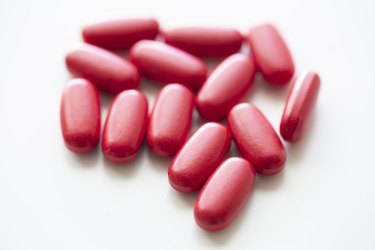
As a trace mineral, iron is a nutrient you need in small amounts. This essential substance is a component of enzymes and proteins. Iron also controls cell development and makes it possible for red blood cells to transport oxygen to every area of your body.
Tip
While taking iron pills won't cause Vitamin D deficiency, the opposite can occur. In some cases, too much Vitamin D can impair your body'a ability to absorb iron.
Video of the Day
Vitamin D benefits include facilitation of calcium absorption to form strong bones and it supports your immune system, according to Harvard Health Publishing. There is no reported issue with vitamin D and iron supplements, according to the National Institutes of Health. That said, you should talk to your doctor about any dietary supplements you take, including vitamin D and iron supplements.
Video of the Day
Read more: Types of Iron Supplements
Understand the Interaction
Although iron pills do not deplete your supply of vitamin D, the opposite may occur. According to a December 2018 articles published by Nutrients, excessive vitamin D or its lengthy supplementation can impair iron absorption.
If you must take both the mineral and the vitamin for an extended period, discuss with your doctor what the best course of action is. She may need to order blood tests regularly to monitor you for signs of anemia.
According to the Mayo Clinic, mild anemia might not cause any symptoms. But, as anemia worsens, it can cause the following signs and symptoms:
- headaches
- difficulty breathing
- chest pain
- dizziness/lightheadedness
- weakness/fatigue
- irregular heartbeat
- pale skin
- cold feet and hands
However, you may be able to avoid interactions between iron and vitamin D if you can get the recommended daily intake for these nutrients from natural sources.
According to Harvard Health Publishing, iron is present in red meats, poultry, legumes and greens. Vitamin D is available from fatty fish, such as salmon and sardines, and fortified milk or margarine.
But the simplest way to get the nutrient is by exposing your skin to the sun which triggers the body to synthesize vitamin D.
Read more: Foods With High Vitamin D
Hit Recommended Targets
The Linus Pauling Institute recommends daily iron intakes based on age and gender. At 19 years of age, a man's requirement is 8 milligrams while a woman needs 18 milligrams of iron. Her recommended intake drops to 8 milligrams when she turns 51.
Do not exceed these daily values without your doctor's recommendation and supervision as too much iron can be fatal. Ask a physician before giving iron supplements to a child or adolescent, to ensure they receive a safe dose.
According to the Linus Pauling Institute, adults up to 70 years of age should consume 600 international units daily. At 71 years of age or older, adults need to take in 800 IU of vitamin D daily. Do not exceed these values unless your doctor recommends higher intakes.
Excessive vitamin D can cause bone loss and kidney stones. Since the nutrient facilitates calcium absorption, too much vitamin D also increases the levels of calcium in your body. The mineral surplus can crystallize and harden your heart.